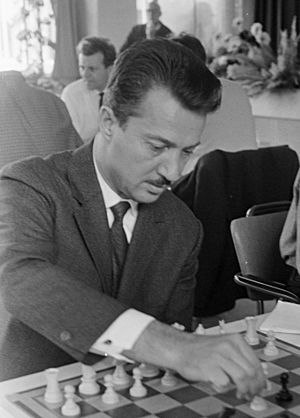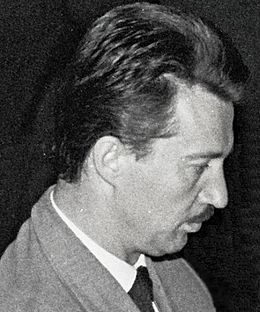Svetozar Gligorić facts for kids
Quick facts for kids Svetozar Gligorić |
|
|---|---|

Gligorić in 1966
|
|
| Full name | Svetozar Gligorić |
| Country | Yugoslavia |
| Born | 2 February 1923 Belgrade, Kingdom of Serbs, Croats and Slovenes |
| Died | 14 August 2012 (aged 89) Belgrade, Serbia |
| Title | Grandmaster (1951) |
| Peak rating | 2600 (July 1971) |
Svetozar Gligorić (Serbian Cyrillic: Светозар Глигорић, born February 2, 1923 – died August 14, 2012) was a famous Serbian and Yugoslav chess grandmaster. He was also a musician. Gligorić won the championship of Yugoslavia a record twelve times. Many people consider him the best chess player ever from Serbia. In 1958, he was even named the best athlete in Yugoslavia.
During the 1950s and 1960s, Gligorić was one of the top chess players in the world. He traveled a lot to play in tournaments, which made him very popular. He was known for his friendly personality. This was shown in the title of his autobiography, I Play Against Pieces. This meant he played the board and the chess pieces, not against the person sitting across from him.
Contents
Early Life and Chess Beginnings
Svetozar Gligorić was born in Belgrade into a family that didn't have much money. He first saw chess when he was a small child, watching people play in a local bar. He started playing chess at age eleven. His mother had taken in a boarder (someone who rented a room), and this person taught him the game.
Gligorić didn't have a real chess set. So, he made his own by carving pieces from wine bottle corks. This is a bit like the story of another famous chess player from that time, Paul Keres from Estonia.
School Days and War
Gligorić was a good student when he was young. He did well in both school subjects and sports. He was even invited to represent his school at a birthday party for Prince Peter. This prince later became King Peter II of Yugoslavia. Gligorić later shared that he felt uncomfortable at this fancy event because his family was poor and he didn't have nice clothes.
His first big chess win was in 1938. He won the Belgrade Chess Club championship. However, World War II soon started and stopped his chess progress for a while. During the war, Gligorić joined a group of fighters called partisans. He was lucky because a partisan officer who played chess found out about his skill. This led to Gligorić being moved away from combat duties.
Becoming a Chess Professional
After World War II, Gligorić worked as a journalist and helped organize chess tournaments for several years. He kept getting better at chess. He earned the International Master (IM) title in 1950. The very next year, in 1951, he became a Grandmaster (GM). Eventually, he decided to play chess full-time as his job. He continued to play in tournaments actively even when he was in his sixties.
Chess Career Highlights
Gligorić was one of the most successful tournament players in the middle of the 20th century. He won many tournaments. However, he wasn't as successful when trying to become the World Chess Champion.
He was the Yugoslav champion many times:
- 1947 (shared the win)
- 1948 (shared the win)
- 1949
- 1950
- 1956
- 1957
- 1958 (shared the win)
- 1959
- 1960
- 1962
- 1965
- 1971
Gligorić proudly represented his home country, Yugoslavia, in fifteen Chess Olympiads. These are big team chess tournaments. He played from 1950 to 1982. In most of these, he played on the top board for his team. At the first Olympiad after the war, in Dubrovnik 1950, Gligorić led Yugoslavia to win the team gold medal. This was a historic moment for his country. The Yugoslav team was often ranked second or third in the world during the 1950s.
International Tournament Wins
Gligorić won many international chess competitions. Some of his first-place finishes include:
He also played often in the famous Hastings tournaments in England. He won or shared first place there five times. This is still a record for that event.
World Championship Attempts
Gligorić often played in tournaments that were part of the World Championship qualifying process. He won several Zonal tournaments (regional qualifiers) in 1951, 1960, 1963, 1966, and 1969. He also did well enough in the Interzonal tournaments (which followed the Zonals) in 1952, 1958, and 1967 to move on to the final Candidates events. However, he didn't have as much success in the Candidates events themselves. He had average results in the 1953 and 1959 Candidates Tournaments. In 1968, he lost a match to Mikhail Tal in the Candidates series.
Legacy in Chess
Even though he had a great tournament record, Gligorić is perhaps best remembered for his work on chess openings and as a commentator. He made huge contributions to the theory and practice of several important chess openings, such as the King's Indian Defence, Ruy Lopez, and Nimzo-Indian Defence.
Opening Theory
Especially with the King's Indian Defence, he used his deep knowledge to win many amazing games. Some important variations (ways of playing) in the King's Indian and Ruy Lopez are even named after him. His games against Bobby Fischer in the King's Indian and Sicilian Defence (especially the Najdorf Variation, which Fischer loved) often ended with Gligorić winning.
Chess Commentator and Author
As a commentator, Gligorić was very good at explaining games clearly and interestingly. This was because he spoke many languages fluently and had trained as a journalist. For many years, he wrote a regular column called "Game of the Month" for Chess Review and Chess Life magazines. These columns were like full lessons on the opening used in the game, along with detailed explanations of all the moves.
He also wrote several chess books in different languages. One of his most famous books was Fischer vs. Spassky: The Chess Match of the Century. This book gave a detailed account of the famous match between Bobby Fischer and Boris Spassky for the world title in Reykjavík in 1972. Gligorić also regularly contributed to Chess Informant, a collection of the world's most important chess games.
Fair Play Award
In 2019, FIDE (the International Chess Federation) created a fair play award named after Gligorić. The Fair Play Svetozar Gligoric Trophy is given out every year. A special group of three people chooses the winner. This award recognizes good sportsmanship, honesty, and promoting ethical behavior in chess.
Notable Games
| This section uses algebraic notation to describe chess moves. |
One of Gligorić's most famous games was his win against former world champion Tigran Petrosian. This game was played at the "Tournament of Peace" in Zagreb in 1970. It shows how skilled Gligorić was playing as Black in the King's Indian Defence. He was willing to attack with sacrifices against Petrosian, who was known as one of the best defenders in chess history. Gligorić also did well in the Zagreb 1970 tournament, tying for second place behind Bobby Fischer.
| a | b | c | d | e | f | g | h | ||
| 8 |

|
8 | |||||||
| 7 | 7 | ||||||||
| 6 | 6 | ||||||||
| 5 | 5 | ||||||||
| 4 | 4 | ||||||||
| 3 | 3 | ||||||||
| 2 | 2 | ||||||||
| 1 | 1 | ||||||||
| a | b | c | d | e | f | g | h | ||
- Petrosian vs. Gligorić, Zagreb 1970; King's Indian Defence, Classical Variation (ECO E97)
1.c4 g6 2.Nf3 Bg7 3.d4 Nf6 4.Nc3 0-0 5.e4 d6 6.Be2 e5 7.0-0 Nc6 8.d5 Ne7 9.b4 Nh5 10.Nd2 Nf4 11.a4 f5 12.Bf3 g5 13.exf5 Nxf5 14.g3 (diagram) Nd4 15.gxf4 Nxf3+ 16.Qxf3 g4 17.Qh1 exf4 18.Bb2 Bf5 19.Rfe1 f3 20.Nde4 Qh4 21.h3 Be5 22.Re3 gxh3 23.Qxf3 Bg4 24.Qh1 h2+ 25.Kg2 Qh5 26.Nd2 Bd4 27.Qe1 Rae8 28.Nce4 Bxb2 29.Rg3 Be5 30.R1a3 Kh8 31.Kh1 Rg8 32.Qf1 Bxg3 33.Rxg3 Rxe4 0–1
Gligorić was actually the first person to beat Petrosian after Petrosian won the world title from Mikhail Botvinnik in 1963.
Death
Svetozar Gligorić passed away on August 14, 2012, at the age of 89. He died from a stroke in Belgrade. He was buried on August 16, 2012, in the Alley of the Greats at Belgrade's New Cemetery.
See also
 In Spanish: Svetozar Gligorić para niños
In Spanish: Svetozar Gligorić para niños


